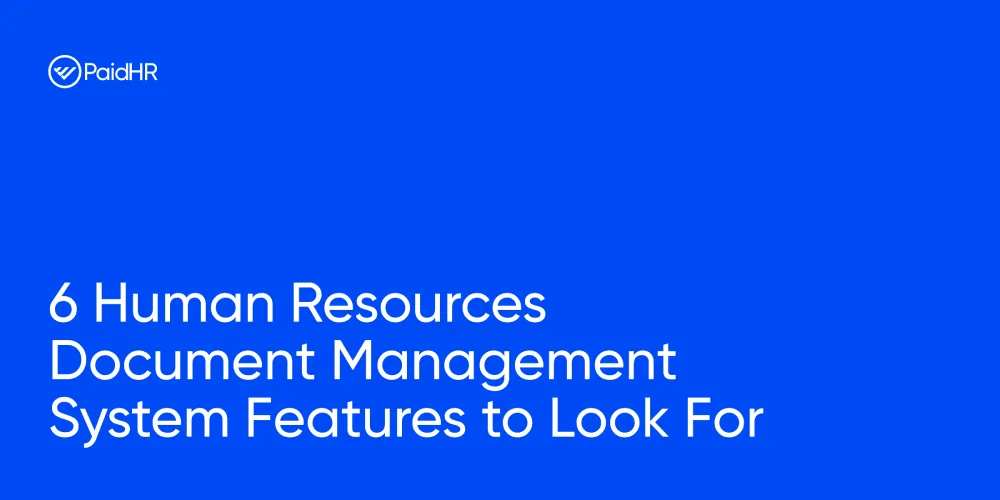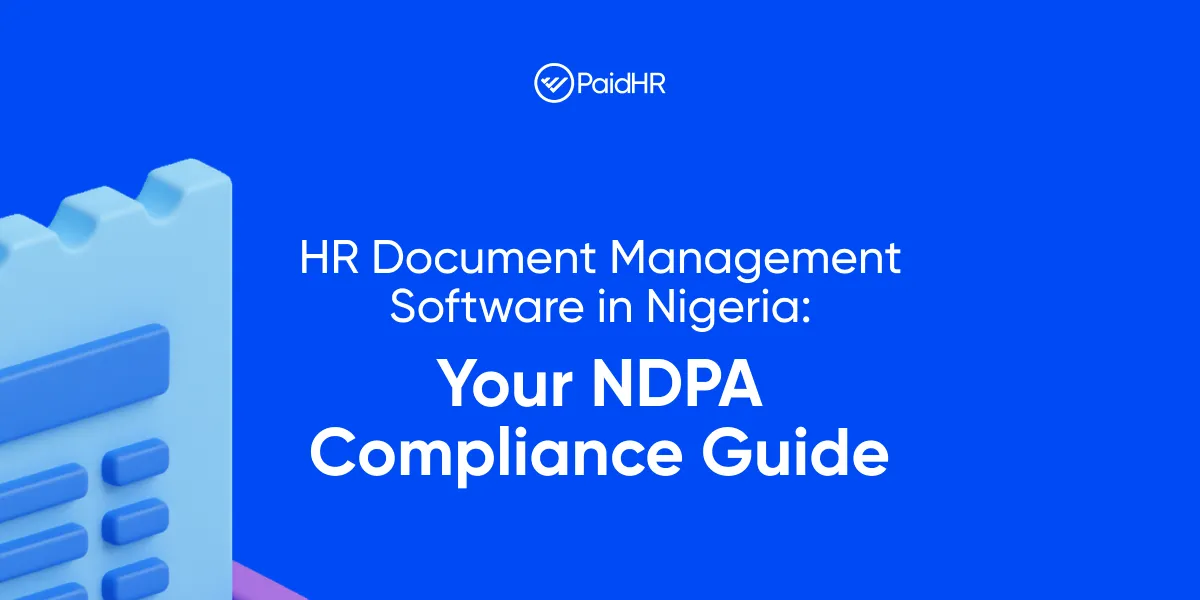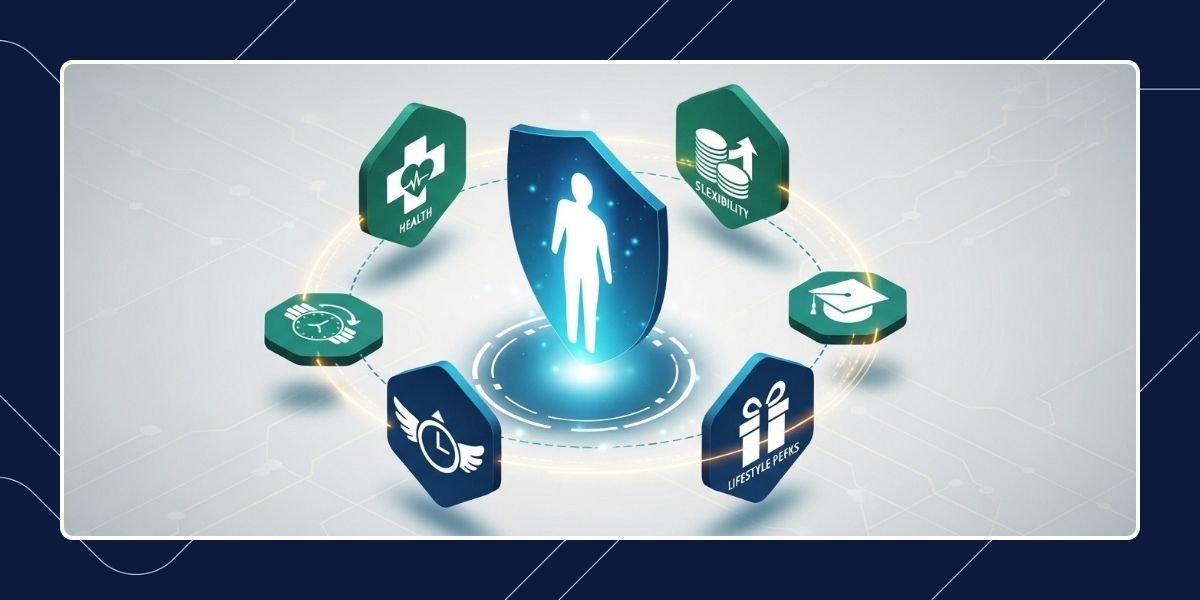If you’re in HR in Nigeria, you’re all too familiar with the chaos: employee records scattered across dusty filing cabinets, disparate hard drives, and chaotic email chains.
From contracts and pension forms to HMO details and NYSC letters, the volume of sensitive data is staggering. This is why more and more businesses are turning to modern HR document management software.
With the Nigeria Data Protection Act (NDPA) now in full force, businesses have a non-negotiable legal obligation to protect employee data. Ignoring this isn’t an option.
The cost of non-compliance can lead to crippling fines, severe reputational damage, and even legal action.
Most articles on this topic focus on generic, feel-good benefits like “going paperless” or list basic features like e-signatures. While helpful, they completely miss the most important question for Nigerian businesses today:
Is your HR document management software NDPA-compliant?
In this guide, we’ll break down exactly what the NDPA means for your HR function, how to choose a software solution that aligns with local law, and the critical red flags to avoid.
Why the NDPA is a Game-Changer for HR
The NDPA 2023 is Nigeria’s most comprehensive data protection law yet. It fundamentally regulates how organisations must collect, store, and use personal data.
For HR professionals, this means virtually every employee-related document is now subject to strict legal scrutiny.
Consider the data you handle daily:
- Employment contracts containing addresses, bank details, and next-of-kin information.
- Pension and HMO records that include sensitive health and financial data.
Under the NDPA, this is all classified as sensitive personal data. Mishandling it is a significant compliance risk. The Act mandates that businesses uphold core principles, including confidentiality, lawful processing, consent, accountability, and secure storage.
This is why the conversation around the Human Resources Document Management System in Nigeria has fundamentally shifted. It has become a critical component of an organisation’s risk management strategy.
The Problem with Global HR Software in a Nigerian Context
Most HR document management software available on the global market is built for international standards.
They heavily market their GDPR or HIPAA compliance, which, while a good baseline, doesn’t automatically mean they meet the unique requirements of the NDPA.
Nigerian businesses often run into specific pitfalls:
Data Hosting Issues
Many global platforms store data on servers in countries not approved under the NDPA’s jurisdiction. This alone can put your business in a non-compliant position.
Lack of Support for Nigerian Documents
The software may not have built-in fields or templates for critical, uniquely Nigerian documents like NHF contributions, PenCom forms, or NYSC letters.
Broad Compliance Claims
A company claiming to be “GDPR-compliant” offers little comfort when your regulator is the Nigeria Data Protection Commission (NDPC).
Hidden Costs of Risk
Even if the software is affordable, the risk of fines and legal penalties for non-compliance can far outweigh the initial cost savings.
Simply put: you can’t just pick an HR document management software with the best reviews on the internet and assume you’re legally covered.
6 Human Resources Document Management System Features to Look For

So, what makes an HR document management software truly “NDPA-ready”? Instead of looking at a generic feature list, you need to connect each function directly to a compliance requirement.
Here’s how to map software features to your legal obligations:
1. Role-Based Access Control → Confidentiality
Only authorised HR personnel should be able to view sensitive records. The software must allow you to set granular permissions, down to a single document.
2. Audit Trails → Accountability
The NDPA requires organisations to prove who accessed data, and when. A robust audit trail ensures you can provide this crucial evidence during an NDPC audit.
3. Consent Management Tools → Lawful Processing
You need a clear, verifiable record of consent for processing employee data, especially for biometrics or health information. The Human Resources Document Management System should make this easy to store and manage.
4. Data Retention and Deletion Controls → Storage Limitation
You cannot keep employee data forever. The NDPA expects you to delete records once their legal retention period expires securely. The right software can automate this.
5. Encryption and Secure Hosting → Data Security
Sensitive records must be encrypted both when stored (at rest) and when transferred (in transit). Look for solutions that host data locally or in NDPA-approved jurisdictions.
6. Local Compliance Support → Practical Guidance
Having access to Nigerian-based support is invaluable. It means you’re not on your own when trying to interpret complex NDPA requirements.
By evaluating an hr document management software with this framework, you can easily distinguish between “nice-to-have” features and essential compliance tools.
The Unique Challenges of a Nigerian HR Document Management Software
Let’s be realistic, HR in Nigeria isn’t a carbon copy of HR in the U.S. or Europe. We manage a unique set of statutory documents that any compliant software must accommodate.
This includes:
- Pension Contribution Forms (PenCom)
- National Housing Fund (NHF) deductions
- HMO records and employee health insurance details
- NYSC posting and completion letters
- Tax clearance and PAYE schedules
A compliant system must allow you to accurately categorise and secure these documents. For instance, HMO records (health data) are highly sensitive and should only be visible to specific authorised personnel.
If a software solution can’t handle these specific document types, you risk creating compliance gaps.
Your NDPA Compliance Checklist for HR Software
Use this simple, six-point checklist when evaluating vendors to ensure you’re making a compliant choice:
- Data Residency: Where is the employee data hosted? Is it local or in an NDPA-approved jurisdiction?
- Document Support: Does it support Nigerian-specific documents like PenCom, NHF, NYSC, and HMO forms
- Consent Management: Can you easily store, update, and retrieve signed employee consents as required by law
- Audit Logs: Are detailed audit logs available and easily exportable for NDPC requests
- Retention Policies: Does the software have features for automating data retention and secure deletion?
- Local Support: Is Nigerian-based support available to assist with NDPA-related questions?
This checklist is a vital tool that could mean the difference between passing an NDPC audit and facing a costly fine.
The Reality of Transitioning from Paper to Digital
The elephant in the room for many Nigerian businesses is the sheer volume of physical files.
Transitioning to a digital Human Resources Document Management System can feel overwhelming, but a systematic approach makes it manageable.
Here’s a realistic plan:
1. Select and Implement the Right HR Document Management Software
Choose a solution that meets your specific needs and NDPA compliance requirements. A strong platform will have built-in tools or partnerships for the steps that follow, meaning you won’t need separate scanning software.
2. Audit and Categorise Records (Within the Software)
Start by taking stock of all your current documents. Use the Human Resources Document Management System’s features to define and classify document types (contracts, pension, etc.)
Apply NDPA principles to mark which documents are sensitive, which require consent, and which have specific retention limits before you start uploading.
3. Digitise and Index
This is the heavy lifting. Scan all relevant physical files.
The modern HR Document Management Software will provide clear upload channels, automated indexing, and tagging features that guide your team or a third-party service, ensuring the digital files land directly in the right employee folder and category.
4. Train Your Team
A new tool is only as effective as the people using it. Ensure your HR staff understands the new workflows and their responsibilities for maintaining data privacy and using the system for ongoing document management.
The transition may be challenging, but the risk of sticking with paper-based, unsecured systems is far greater than the effort required to modernise.
For Nigerian businesses still in doubt, the best modern HR software solution is built to eliminate the guesswork and execute the shift effortlessly for you.
Your HR Software is a Risk Shield
The NDPA has permanently changed how Nigerian businesses must manage employee data. Choosing HR document management software is a strategic decision to protect your business and its future.
The right system does more than help you “go paperless.” It acts as a powerful shield, protecting you from legal penalties, building trust with your employees, and ensuring you are fully compliant with Nigeria’s data protection laws.
Before you subscribe to that global solution with slick marketing, pause and ask yourself: Is this software truly NDPA-ready?
If you are looking for an HR Document Management System that checks off the boxes from your checklist, your best bet is PaidHR.
The core value of the company lies in managing the most sensitive data, such as employee documents and payroll records, through features that directly address the core principles of the NDPA.
Because in 2025, efficiency is important, but compliance is survival.
Frequently Asked Questions
1. What is HR document management software?
It is a digital system that helps businesses securely store, organise, and manage employee records such as contracts, pension forms, and performance files.
2. Why is it important for NDPA compliance?
The NDPA requires businesses to protect employee data. HR software helps you control access, manage consent, and maintain audit trails, making it easier to meet your legal obligations.
3. Where should Nigerian businesses host employee data under the NDPA?
For NDPA compliance, employee data should be hosted either locally in Nigeria or in an NDPA-approved jurisdiction.
The Nigeria Data Protection Commission (NDPC) publishes a list of countries with data protection laws considered adequate. Using unapproved international servers puts your business at risk of non-compliance and potential penalties.
4. How do we transition from paper files to compliant software?
The easiest and safest approach is to first select an HR document management solution that is already compliant with the NDPA.
Once you choose the right platform, your HR team simply defines which paper records need to be kept and then scans and uploads those files.
The software then takes over: it automatically organises the documents, applies the necessary security permissions (so only authorised people can view sensitive data), and maintains a clear audit trail.
This process eliminates the complexity, ensuring your transition to a digital, compliant system is straightforward and secure.







